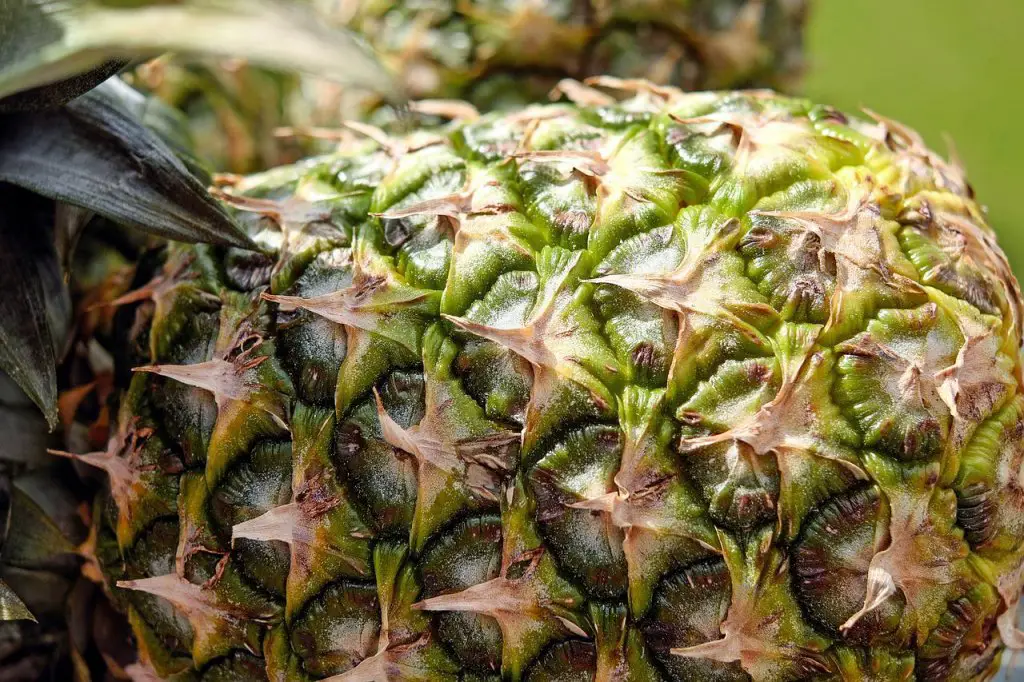Pineapples are compostable. However, use a pineapple that has over-ripened and is starting to rot. It’s less acidic than fresh pineapple. A pineapple compost is full of nutrients that the plants need for healthy growth. It also improves the texture, water retention, and soil moisture content.
Fresh pineapple is not suitable because it is quite acidic. When you have fresh pineapple, give it more days before using it.
Table of Contents
Can You Compost Pineapple: Will It Affect The pH Of Your Compost?
Pineapple fruit ( ananas comosus) is one of the delicious and nutritious tropical fruits that we all love. It contains antioxidants, nutrients, and many other compounds such as enzymes that help fight diseases and inflammation. In addition, it aids digestion and boosts our immunity.
They are also very acidic fruits, but this should not stop you from toasting them in the compost pile. The acidity in pineapple comes from the citric acid in various fruits like citrus.
The acidity usually depreciates as the pineapple continues to ripen. As time goes by and it starts to decompose, just a little of the citric acid remains.
However, If you are still worried about the acid in the fruit, try using a deacidifying agent like the hydrated white lime.
The white lime reacts with any low acidic PH to the desired level. Also, when adding the pineapples, sprinkling lime on the pile will help balance the PH.
What Parts Of A Pineapple Can Be Composted?
Every pineapple part is compostable; it will decompose in the long run.
However, the fleshy, juicy part is soft and decomposes quickly, leaving the middle, spiky crown, and quite solid peel.
If you chop the hard parts into smaller pieces, it speeds up the decomposition process.
How Long Does It Take For a Pineapple To Decompose?
Composting pineapple may take 3 to 6 months under favorable conditions.
Favorable conditions for composting pineapple include:
- ensuring that the temperature is high inside the compost
- shredding the hard parts of the pineapple
- having the right compost bin
- tightly covering the compost
How To Compost Pineapple: An Easy Step-By-Step Guide
Step 1: Wash or rinse the pineapple properly.
Pineapples are sprayed with pesticides on the farm; you should thoroughly rinse them to remove all the pesticide residues.
Step 2: Shred all the outer parts into smaller pieces.
The outer part and stem are hard. Shredding them into smaller pieces will help in quickening their decomposition process.
Step 3: Prepare your compost bin.
The compost bin should always be clean. Besides, it should be of the right size. Always try to have a compost bin at least 3 by 3 feet.
Step 4: Put the brown materials in the compost.
Brown materials include dry leaves, newspapers, hays, shredded cardboard, and sawdust. The brown materials decompose slowly but are vital for a complete compost pile.
Step 5: Add pineapples.
After you have washed, shredded, and mixed your pineapple well, add it to the compost.
Step 6: Add all the green materials.
The green materials include grass clipping, kitchen waste, and food waste.
Green materials are rich in nitrogen; the compost needs nitrogen-rich materials to heat and create an enabling environment for the microbes to grow and multiply faster.
Step 7: Ensure that the composting materials have a good ratio of greens and browns.
For good compost, the ratio of brown to green should be 4:1.
Step 8: Add soil on the top and seal.
Tightly seal your compost so that it may have the right temperature needed for composting to take place.
Step 9: Turn the compost pile after 2 weeks.
After two weeks of sealing, start turning the compost with a shovel to allow other parts of the compost yet to decompose to reach the middle, where decomposition mostly takes place.
Turning also allows for aeration of the compost.
Step 10: Sprinkle water if the compost is too dry.
Your compost should be moist, and since you are composting pineapple with high moisture content, it should require less water. However, if you find that it is dry, sprinkle more water.
Step 11: Wait for 3 to 6 months for full decomposition.
Compost piles in good condition should take 3 to 6 months to decompose fully. However, it may take longer, up to one year.

Can You Vermicompost Pineapple?
Yes, you can vermicompost pineapple. You only need to ensure that the pineapple is over ripe.
A freshly riping pineapple is very acidic and may harm the worms.
Is Pineapple Good For The Soil?
The soil receives various benefits when pineapples are added to the compost.
They include:
1. Improving The Soil Texture
Pineapples are full of calcium, and the soil needs calcium to improve its texture. Your garden soil will benefit from fully decomposed pineapple compost.
2. Provides Plants Nutrients To The Soil
A compost containing pineapple is a great source of organic plant fertilizer. The compost peel will have essential nutrients for plant growth, such as phosphorous, zinc, and calcium.
Phosphorous helps grow healthy and vigorous plants, whereas zinc is essential in activating enzymes that synthesize proteins. Lastly, calcium plays a vital role in the nutrition and growth of plants.
3. Improves The Presence Of Macro And Micronutrients In The Soil
When added to the soil, a compost with pineapple improves the presence of good bacteria, fungi, and actinomycetes in the soil.
Besides, it also activates acid phosphates, invertase, and catalase in the garden soil. The micronutrients are beneficial because they reduce pests and have vital nutrients needed.
4. Adding Moisture To The Compost Pile
For quick breakdown and decomposition to take place, every compost bin needs moisture.
Pineapples flesh is full of juice that will moisten the bin and reduce the need for water.
5. Infuses Sugar And Protein Into The Compost
A good compost requires a good balance of nitrogen and carbon. Pineapples have both of these vital components of compost. The inner fleshy part contains protein that generates nitrogen, and the outer part has carbon.
With their presence, the microbes responsible for decomposition will develop quickly, multiply, and decomposes all the organic materials in the compost.
6. Pineapple Attracts Earthworms
Even though pineapples are acidic, they are also quite sugary, and the acidity reduces as it decomposes while the sugar level remains the same.
No wonder they are earthworms’ best friends. It also makes it ideal for vermicomposting, a decomposition process that utilizes worms.
Can You Use Pineapple As Fertilizer?
Pineapple can make a good organic fertilizer. This is because pineapples are full of nitrogen that is needed in the soil. So when you add other things like chicken litter with pineapple peels, you can easily spread them to the farm as a fertilizer.
However, this type of mix could attract rodents and other animals. To avoid this, the best way of adding it to the soil is to compost it with other organic materials.

